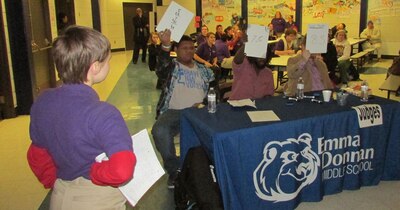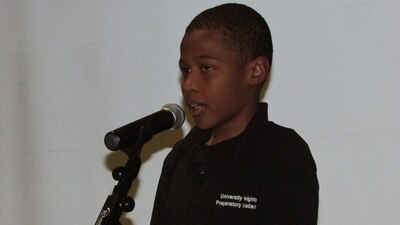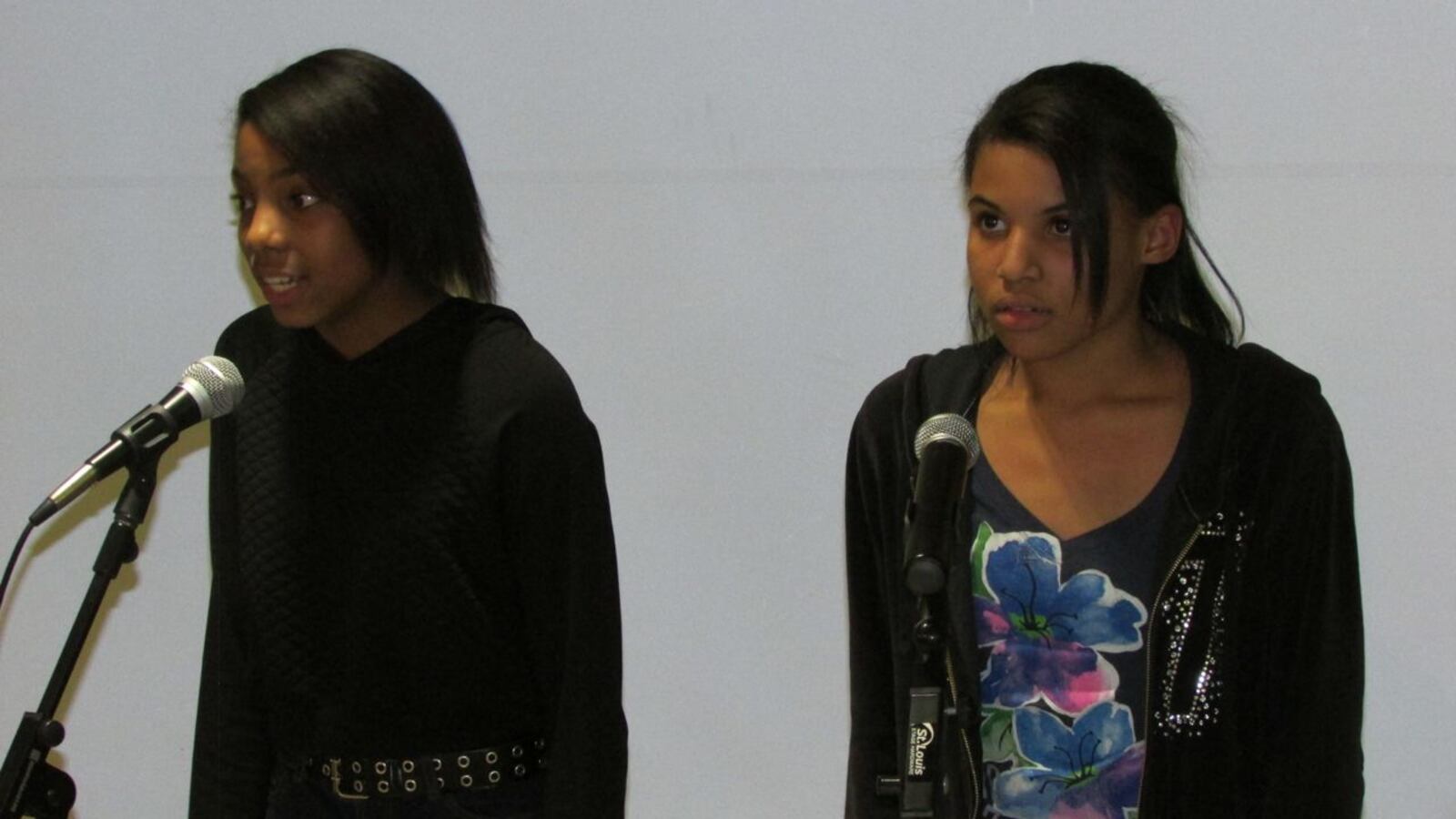Inspiration came for Emma Donnan Middle School’s Angel Fisher as she thought about heavy questions of censorship, racism and death — topics you might expect a gathering of 30 middle schoolers and their teacher to tread lightly around.
Instead, during a frank conversation with the group, Fisher felt the beginnings of a poem she wanted to write coming together in her mind about thoughtlessness for the despair of others.
A few weeks later, she’d stand before a room full of poetry slam competitors, teachers, parents and a three-judge panel to perform “Ebola Poem,” her emotional answer to the way some of her classmates have joked about the disease and even used it as the basis for game of tag — called “Ebola touch” — at school.
The more she thought about her classmates’ attitudes, the more it bothered her.
“Ebola was a costume for Halloween this year,” she wrote in the poem. “What madness! Is cancer a costume? If you hear someone joking about the matter, stop it as fast as you can, before it continues to spread like a plague.”
To some, poetry might sound ancient and inaccessible to today’s youth. But in fact it can be quite the opposite, especially for kids who attend high-poverty schools where many feel marginalized for being different. Much like rap music, poetry is a form of expression that allows kids to explore deep feelings ranging from intense joy to profound sadness.
In a small group of aspiring poets who meet after school, kids can learn to trust and open up.
“We have students from all over the spectrum,” said Tony DelaRosa, a co-founder of Indy Pulse and Fisher’s coach at Donnan. “That, in itself as a natural phenomenon, helps foster a challenging conversation that they wouldn’t normally have to engage in if they were in school.”
A new Indianapolis student poetry league
IndyPulse is a fledgling seven-team spoken word league started by three Indianapolis teachers now in its second season. The founders all came to Indianapolis through Teach for America, the influential national group that places top college graduates as teachers in high poverty classrooms.

DelaRosa, Lauren Hall and Camea Davis were able to make what had been more of a long-term dream into a reality quickly when the idea won $6,000 in an education innovation competition in 2012 put on by Teach Plus, a national organization that aims to spur teachers to get involved in education policy work and advocacy, called InnovatED.
Indy Pulse is looking to expand to more Indianapolis and suburban schools, and teachers shouldn’t worry if poetry is new to them, DelaRosa said.
“Teachers without spoken work backgrounds can do the program,” he said. “We want to encourage that. Everyone has a little bit of poetry in them, we can help you bring that out.”
While new here, poetry slam has been growing nationally. Chicago’s Louder Than A Bomb annual poetry festival attracted more than 1,000 youth poets last year in its 14th year.
This year, DelaRosa wants his students to put their poems together into a book. Some have already had poems published at an art show at Fletcher Place Arts and Books, just south of downtown. He wants to find a way to bring in a wider range of performers for students so they can see college-age and adult poets in action and learn from them.
Through the lens of the poems DelaRosa’s students write, read and analyze, his team has become comfortable opening up in conversations that lead them to explore different points of view on topics like culture, religion and stereotypes.
While they take many different approaches, attacking those sorts of issues requires critical thinking that can be valuable both to their classroom work and to their other interests, like music or novels.
“One student says, ‘I don’t write poetry, I write song lyrics,’” DelaRosa said. “We also have writers who are more the ‘Stephen King’ poets — very dark and very high-level writers — and have extensive vocabularies, but they are learning to present their ideas.”
Tackling tough issues
DelaRosa was barely through the door for a recent team practice when the students began excitedly talking about poems they had read or were working on. He quickly sat them down at desks arranged in a semi-circle and had each list their “highs” and “lows” of the day.

Then he suggested they begin trying to turn those lists into poems.
“I’m going to write a haiku about it,” one girl said, leaning over her notebook to begin counting syllables.
Indy Pulse teams typically meet once a week for an hour. DelaRosa, Hall and Davis wrote curriculum for teachers to follow that aims to reinforce lessons learned at school but leave plenty of room to explore big ideas deeply.
Take DelaRosa’s next topic for the day: Power.
“Look for the powerful and powerless moments in this poem,” he instructed.
He showed a video of poem called “Changing the World One Word at a Time,” which was performed by three teenage girls from Southern California on actress Queen Latifah’s talk show. The poem is about censorship and other lessons kids learn in school that aren’t purposely taught by adults.
“But the greatest lessons you will ever teach us will not come from your syllabus,” one girl in the video recites, before being joined by her two classmates. “The greatest lessons you will ever teach us you will not even remember.”
It was the imagery in the poem made Fisher think of how her classmates were talking about the recent outbreak of Ebola. That they were pretending to “tag” each other with the disease made Fisher angry, which led to a good poem.
Another student drew a connection between the poem’s lines about banned books and the “n-word” to the group’s previous discussions about race and stereotypes. He said other kids used the word all the time in the hallways and he wondered why teachers didn’t say anything — the genesis of another potential poem.
As the students began writing down their thoughts, DelaRosa confided that these exercises won’t just contribute to good poems that might help them win competitions. It might help them in lots of ways they won’t realize for awhile.
In fact, he believes these experiences will teach his students that they can pursue careers in the arts, and that their work with Indy Pulse connects with what they do at school and moves them further than typical after-school tutoring would.
“Tutoring would be remediation, giving more time for the same skills,” he said.
But poetry is different, DelaRosa said.
“It’s not just more time, it’s doing it in a creative way,” he said. “They actually want to come and learn and write. We low-key sneak in ISTEP prompts into our curriculum because we want to make sure they are actually writing and learning.”
Finding a calling through Indy Pulse
It was DelaRosa’s sister who introduced him to spoken word poetry when he was about 14.
Through poetry, he found an outlet to work through difficult times in his own life as he was growing up poor and being bullied in school. All the time, he got better at writing and performing. It also got him interested in teaching.
Through Indy Pulse, it turned out, poetry has both kept him in teaching and in Indianapolis.
DelaRosa wasn’t sure teaching was for him during his first year in the classroom at IPS School 103.
After a fellow teacher was robbed late in the school year, it seemed like a sign to move on. He considered packing it in at the end of the school year and heading to pursue another career.
But first, he helped Hall and Davis pitch Indy Pulse at InnovatED. Then the idea won the top prize.
Suddenly DelaRosa had a way to channel his love for poetry to lots of kids. Last week, two of his students — Dillion Stewart and Johana Hernandez — took second and third place in a competition that Donnan hosted.
He hopes the league will grow and even more will find it can change their lives, too.
“I was literally not wanting to teach anymore and leave the city,” Delarosa, 25, said. “Indy Pulse is the reason why I am here teaching because that’s my passion. At my core, poetry is my main thing.”


